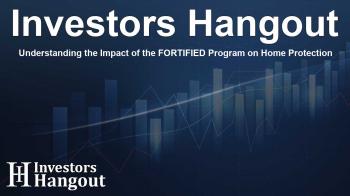Understanding the Impact of the FORTIFIED Program on Home Protection

The FORTIFIED Program's Impact on Hurricane Resilience
Homeowners in coastal regions are increasingly prioritizing construction methods that can withstand severe weather conditions, particularly hurricanes. The FORTIFIED program, established by the Insurance Institute for Business & Home Safety (IBHS), serves as a beacon for building stronger, more resilient homes. A recent peer-reviewed study has shed light on how homes designated as FORTIFIED significantly outperform those constructed using standard building practices, especially during hurricane events.
Study Overview and Key Findings
This insightful study analyzed the performance of FORTIFIED homes during Hurricane Sally, a strong Category 2 storm that impacted coastal areas. The results revealed that homes adhering to the FORTIFIED guidelines experienced notably less damage and filed fewer insurance claims compared to their conventionally built counterparts. This finding provides a compelling argument for homeowners to consider the FORTIFIED designation when building or retrofitting their homes.
Hurricane Sally: A Benchmark for Evaluation
Hurricane Sally's landfall offered a unique scenario to assess the effectiveness of FORTIFIED construction. This storm marked the first time a significant number of FORTIFIED homes faced the impact of a hurricane, allowing researchers to compile comprehensive data. The research indicated a substantial potential for insurance companies to reduce losses significantly if more homes were built or retrofitted using FORTIFIED standards.
Financial Implications of the FORTIFIED Approach
The study estimated that if every home in the storm's path had adhered to the FORTIFIED Roof standard, insurers could have saved approximately $105.6 million. For those built to the FORTIFIED Gold standard, this figure rose to around $116.1 million, showcasing the financial benefits of resilient construction. This data emphasizes the economic rationale for investing in secure building practices and promotes awareness among communities about disaster preparedness.
Insights from Industry Experts
Alabama Insurance Commissioner Mark Fowler expressed satisfaction with the findings, stating, "The FORTIFIED system exceeded every expectation and proved that mitigation works not just in controlled environments but in real-world scenarios." This positive feedback from officials highlights the necessity of such programs in safeguarding lives and properties along the Gulf Coast.
The results also outlined a decrease in claim severity for FORTIFIED homes by as much as 40%. Furthermore, these homes demonstrated a reduction in loss frequency ranging from 55% to 74%, indicating a profound impact on insurance metrics and costs for homeowners.
Building Codes and Community Resilience
The success of the FORTIFIED program lies in its detailed construction standards and robust evaluation processes. Homes are assessed rigorously to ensure they meet these high standards, presenting a contrast to conventional homes built to minimum municipal codes. The data suggest that communities embracing FORTIFIED construction can create a safer living environment while enhancing their insurability.
Environmental and Economic Benefits
Implementing the FORTIFIED program effectively aligns with broader goals of community resilience and environmental sustainability. As more coastal homeowners adopt these standards, the collective impact could lead to reduced overall damage costs in the long run. This also supports local economies by lowering insurance premiums and facilitating quicker recovery in the aftermath of storms.
Community Initiatives and Support
In promoting the adoption of FORTIFIED standards, various initiatives have been launched, such as the Strengthen Alabama Homes program. This innovative initiative offers grants to homeowners for retrofitting their houses to comply with FORTIFIED guidelines, thus enhancing community resilience significantly.
Conclusion and Future Outlook
The message is clear: FORTIFIED works, as evidenced by the outcomes from Hurricane Sally. As communities continue to face the threat of hurricanes and extreme weather, the call to action is for all stakeholders—homeowners, builders, and policymakers—to embrace these proactive measures. Emphasizing education on FORTIFIED construction will contribute to safer and more resilient communities, ensuring a better quality of life and reducing the socioeconomic impacts of devastating weather events.
Frequently Asked Questions
What is the FORTIFIED program?
The FORTIFIED program is a set of building standards aimed at enhancing the hurricane resilience of homes. It provides guidelines for construction and retrofitting to minimize damage during storms.
How does the FORTIFIED program improve insurance outcomes?
Homes built to the FORTIFIED standards have shown significantly lower insurance claims and costs, making them more appealing to insurers and homeowners alike.
What were the key findings of the study on Hurricane Sally?
The study found that FORTIFIED homes suffered less damage and required fewer claims, leading to substantial savings for insurers and homeowners during Hurricane Sally.
How can homeowners participate in the FORTIFIED program?
Homeowners can participate by building new homes to FORTIFIED standards or retrofitting existing homes. They can also explore state programs offering financial incentives for FORTIFIED construction.
Why is the FORTIFIED program important for coastal communities?
The FORTIFIED program is crucial for coastal communities as it promotes stronger, more resilient homes that can withstand hurricanes, thereby reducing disaster recovery costs and enhancing safety.
About The Author
Contact Hannah Lewis privately here. Or send an email with ATTN: Hannah Lewis as the subject to contact@investorshangout.com.
About Investors Hangout
Investors Hangout is a leading online stock forum for financial discussion and learning, offering a wide range of free tools and resources. It draws in traders of all levels, who exchange market knowledge, investigate trading tactics, and keep an eye on industry developments in real time. Featuring financial articles, stock message boards, quotes, charts, company profiles, and live news updates. Through cooperative learning and a wealth of informational resources, it helps users from novices creating their first portfolios to experts honing their techniques. Join Investors Hangout today: https://investorshangout.com/
The content of this article is based on factual, publicly available information and does not represent legal, financial, or investment advice. Investors Hangout does not offer financial advice, and the author is not a licensed financial advisor. Consult a qualified advisor before making any financial or investment decisions based on this article. This article should not be considered advice to purchase, sell, or hold any securities or other investments. If any of the material provided here is inaccurate, please contact us for corrections.

